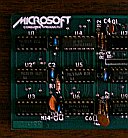Mining Monday: the hardware collection

There’s a fine line between collecting and just not knowing when to throw stuff out. Sometime in the last few years I switched from the latter to the former – in the realm of vintage computer hardware, anyway. Because the OCD aspects of collecting kind of freak me out, I don’t get too organized about it. I like portable stuff; I like Apple stuff; I like stuff that’s cleverly designed. I like stuff I’ve actually used; I like getting stuff really cheap on eBay.